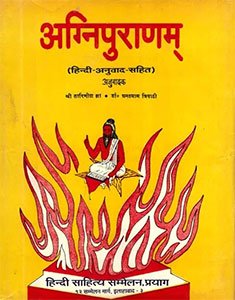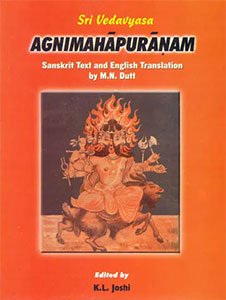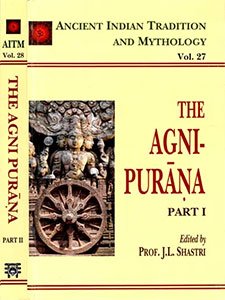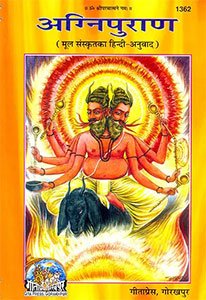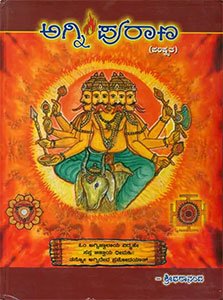Agni Purana [sanskrit]
97,288 words
This Sanskrit edition of the Agnipurana. It is one of the traditional eighteen Mahapuranas presented as an encyclopedia of ancient Indian history and knowledge. It contains either 382 or 383 chapters and over 10.000 verses (Sanskrit Shlokas).
Verse 315.14
भूर्ज्जे वा प्रतिमायां वा मारणाय रिपोर्ग्रहाः ।
ओं कुञ्जरी ब्रह्माणी । ओं मञ्जरी माहेश्वरी ।
ओं वेताली कौमारी ओं काली वैष्णवी ।
ओं अघोरा वारही । ओं वेताली इन्द्राणी उर्व्वशी । ओं जयानी यक्षिणी ।
नवमातरो हे मम शत्रु गृह्णत ।
भूर्ज्जे नाम रिपोर्लिख्य श्मशाने पूजिते म्रियेत् ॥ १४ ॥
bhūrjje vā pratimāyāṃ vā māraṇāya riporgrahāḥ |
oṃ kuñjarī brahmāṇī | oṃ mañjarī māheśvarī |
oṃ vetālī kaumārī oṃ kālī vaiṣṇavī |
oṃ aghorā vārahī | oṃ vetālī indrāṇī urvvaśī | oṃ jayānī yakṣiṇī |
navamātaro he mama śatru gṛhṇata |
bhūrjje nāma riporlikhya śmaśāne pūjite mriyet || 14 ||
The Sanskrit text of Verse 315.14 is contained in the book The Agni Puranam (Anandashram Edition) by Shri Chimna Apate (श्री चिमणा आपटे). This book is available online or you could buy the latest edition:
Read online Buy now! The Sanskrit text by Shri Chimna Apate (श्री चिमणा आपटे) (1987)
Glossary of Sanskrit terms
Note: This extracts Sanskrit terms and links to English definitions from the glossary, based on an experimental segmentation of verse (315.14). Some terms could be superfluous while some might not be mentioned. Click on the word to show English definitions.
Bhu, Urjja, Pratimaya, Pratima, Var, Marana, Rip, Ripu, Graha, Kunjari, Brahmani, Brahman, Manjari, Maheshvari, Vetali, Kaumari, Kali, Kalin, Vaishnavi, Aghora, Vara, Indrani, Yakshini, Yakshin, Navama, Ara, Asmad, Grihnat, Naman, Likhya, Shmashana, Pujita,
Analysis of Sanskrit grammar
Note: this is an experimental feature and only shows the first possible analysis of the Sanskrit text (Verse 315.14). If the system was successful in segmenting the sentence, you will see of which words it is made up of, generally consisting of Nouns, Pronouns, Verbs, Participles and Indeclinables. Click on the link to show all possible derivations of the word.
- Line 1: “bhūrjje vā pratimāyāṃ vā māraṇāya riporgrahāḥ ”
- bhū -
-
bhu (noun, masculine)[compound], [adverb], [nominative dual], [vocative dual], [accusative dual]bhu (noun, neuter)[compound], [adverb], [nominative single], [vocative single], [accusative single]bhu (noun, feminine)[compound], [adverb], [nominative dual], [vocative dual], [accusative dual]bhū (noun, masculine)[compound], [adverb], [vocative single]bhū (noun, neuter)[compound], [adverb], [nominative single], [vocative single], [accusative single]bhū (noun, feminine)[compound], [adverb], [vocative single]
- ūrjje -
-
ūrjja (noun, masculine)[locative single]ūrjja (noun, neuter)[nominative dual], [vocative dual], [accusative dual], [locative single]ūrjjā (noun, feminine)[nominative dual], [vocative single], [vocative dual], [accusative dual]
- vā -
-
vā (indeclinable conjunction)[indeclinable conjunction]vā (noun, feminine)[nominative single]√vā (verb class 1)[imperative active second single]
- pratimāyām -
-
pratimāyā (noun, feminine)[accusative single]pratimā (noun, feminine)[locative single]
- vā* -
-
vār (noun, masculine)[adverb], [nominative single], [vocative single]vār (noun, neuter)[adverb], [nominative single], [vocative single], [accusative single]va (noun, masculine)[nominative plural], [vocative plural]vā (noun, feminine)[nominative plural], [vocative plural], [accusative plural]
- māraṇāya -
-
māraṇa (noun, neuter)[dative single]
- ripor -
-
rip (noun, feminine)[genitive dual], [locative dual]ripu (noun, masculine)[ablative single], [genitive single]ripu (noun, feminine)[ablative single], [genitive single]
- grahāḥ -
-
graha (noun, masculine)[nominative plural], [vocative plural]grahā (noun, feminine)[nominative plural], [vocative plural], [accusative plural]
- Line 2: “oṃ kuñjarī brahmāṇī | oṃ mañjarī māheśvarī ”
- Cannot analyse om*ku
- kuñjarī -
-
kuñjarī (noun, feminine)[compound], [nominative single]
- brahmāṇī -
-
brahmāṇī (noun, feminine)[compound], [nominative single]brahman (noun, neuter)[nominative plural], [vocative plural], [accusative plural]
- Cannot analyse om*ma
- mañjarī -
-
mañjarī (noun, feminine)[compound], [nominative single]
- māheśvarī -
-
māheśvarī (noun, feminine)[compound], [nominative single]
- Line 3: “oṃ vetālī kaumārī oṃ kālī vaiṣṇavī ”
- Cannot analyse om*ve
- vetālī -
-
vetālī (noun, feminine)[compound], [nominative single]
- kaumārī -
-
kaumārī (noun, feminine)[compound], [nominative single]
- Cannot analyse om*kā
- kālī -
-
kālī (noun, feminine)[compound], [nominative single]kālin (noun, masculine)[nominative single]
- vaiṣṇavī -
-
vaiṣṇavī (noun, feminine)[compound], [nominative single]
- Line 4: “oṃ aghorā vārahī | oṃ vetālī indrāṇī urvvaśī | oṃ jayānī yakṣiṇī ”
- Cannot analyse om*ag
- aghorā* -
-
aghora (noun, masculine)[nominative plural], [vocative plural]aghorā (noun, feminine)[nominative plural], [vocative plural], [accusative plural]
- vāra -
-
vāra (noun, masculine)[compound], [vocative single]vāra (noun, neuter)[compound], [vocative single]
- hī -
-
- Cannot analyse om*ve
- vetālī -
-
vetālī (noun, feminine)[compound], [adverb], [nominative single], [vocative single]
- indrāṇī -
-
indrāṇī (noun, feminine)[compound], [nominative single]
- Cannot analyse urvvaśī*oṃ
- Cannot analyse om*ja
- jayānī -
-
- yakṣiṇī -
-
yakṣiṇī (noun, feminine)[compound], [nominative single]yakṣin (noun, neuter)[nominative dual], [vocative dual], [accusative dual]
- Line 5: “navamātaro he mama śatru gṛhṇata ”
- navamāt -
-
navama (noun, masculine)[adverb], [ablative single]navama (noun, neuter)[adverb], [ablative single]
- aro* -
-
ara (noun, masculine)[nominative single]
- he -
-
ha (noun, masculine)[locative single]ha (noun, neuter)[nominative dual], [vocative dual], [accusative dual], [locative single]hā (noun, feminine)[nominative dual], [vocative single], [vocative dual], [accusative dual]√as (verb class 2)[present middle first single]
- mama -
-
asmad (pronoun, none)[genitive single]√mā (verb class 2)[perfect active second plural]√mā (verb class 3)[perfect active second plural]√mā (verb class 4)[perfect active second plural]√mā (verb class 1)[perfect active second plural]
- śatru -
-
śatru (noun, masculine)[compound], [adverb]
- gṛhṇat -
-
gṛhṇat (noun, masculine)[compound]gṛhṇat (noun, neuter)[nominative single], [vocative single], [accusative single]√grah -> gṛhṇat (participle, neuter)[nominative single from √grah class 9 verb], [vocative single from √grah class 9 verb], [accusative single from √grah class 9 verb]
- a -
-
a (noun, masculine)[compound], [vocative single]
- Line 6: “bhūrjje nāma riporlikhya śmaśāne pūjite mriyet ”
- bhū -
-
bhu (noun, masculine)[compound], [adverb], [nominative dual], [vocative dual], [accusative dual]bhu (noun, neuter)[compound], [adverb], [nominative single], [vocative single], [accusative single]bhu (noun, feminine)[compound], [adverb], [nominative dual], [vocative dual], [accusative dual]bhū (noun, masculine)[compound], [adverb], [vocative single]bhū (noun, neuter)[compound], [adverb], [nominative single], [vocative single], [accusative single]bhū (noun, feminine)[compound], [adverb], [vocative single]
- ūrjje -
-
ūrjja (noun, masculine)[locative single]ūrjja (noun, neuter)[nominative dual], [vocative dual], [accusative dual], [locative single]ūrjjā (noun, feminine)[nominative dual], [vocative single], [vocative dual], [accusative dual]
- nāma -
-
nāman (noun, neuter)[compound], [adverb], [nominative single], [vocative single], [accusative single]
- ripor -
-
rip (noun, feminine)[genitive dual], [locative dual]ripu (noun, masculine)[ablative single], [genitive single]ripu (noun, feminine)[ablative single], [genitive single]
- likhya -
-
likhya (noun, masculine)[compound], [vocative single]√likh -> likhya (absolutive)[absolutive from √likh]
- śmaśāne -
-
śmaśāna (noun, neuter)[nominative dual], [vocative dual], [accusative dual], [locative single]
- pūjite -
-
pūjita (noun, masculine)[locative single]pūjita (noun, neuter)[nominative dual], [vocative dual], [accusative dual], [locative single]pūjitā (noun, feminine)[nominative dual], [vocative single], [vocative dual], [accusative dual]√pūj -> pūjita (participle, masculine)[locative single from √pūj class 1 verb], [locative single from √pūj class 10 verb]√pūj -> pūjita (participle, neuter)[nominative dual from √pūj class 1 verb], [vocative dual from √pūj class 1 verb], [accusative dual from √pūj class 1 verb], [locative single from √pūj class 1 verb], [nominative dual from √pūj class 10 verb], [vocative dual from √pūj class 10 verb], [accusative dual from √pūj class 10 verb], [locative single from √pūj class 10 verb]√pūj -> pūjitā (participle, feminine)[nominative dual from √pūj class 1 verb], [vocative single from √pūj class 1 verb], [vocative dual from √pūj class 1 verb], [accusative dual from √pūj class 1 verb], [nominative dual from √pūj class 10 verb], [vocative single from √pūj class 10 verb], [vocative dual from √pūj class 10 verb], [accusative dual from √pūj class 10 verb]
- mriyet -
-
√mṛ (verb class 6)[optative active third single]
Other editions:
Also see the following editions of the Sanskrit text or (alternative) English translations of the Verse 315.14
Agni Purana with Hindi Translation
by Tarinish Jha and Dr. Ghanshayam Tripathi (तारिणीश् झा और डॉ. घनश्याम त्रिपाठी) (2007)
Publisher: Hindi Sahitya Sammelan, Allahabad; 1199 pages; Title: अग्निपुराणम् (संस्कृत एवं हिन्दी अनुवाद);
Buy now!
Agni Purana (Two Volumes)
by M. N. Dutt (2023)
Publisher: Parimal Publication Pvt. Ltd.; Editor: K. L. Joshi.; ISBN-10: 8171101690; ISBN-13: 9788171101696; 1070 pages.
Buy now!
Agni-Purana (Set of 4 Volumes)
by N. Gangadharan (2006)
Publisher: Motilal Banarsidass Publishers Pvt. Ltd.; ISBN: Part I 8120803590 (9788120803596); Part II 8120803604 (9788120803602); Part III 8120801741 (9788120801745); Part IV 812080306X (9788120803060); 1271 pages.
Buy now!
The Agni Purana (Hindi)
by (2013)
Publisher: Gita Press, Gorakhpur; Title: अग्निपुराण (केवल हिन्दी अनुवाद); ISBN-10: 8129302934; ISBN-13: 9788129302939; 848 pages.
Buy now!
Agni Purana (Kannada)
by Sreedharananda (2013)
Publisher: Pooja Pusthaka Bhandara, Bangalore; Title: ಅಗ್ನಿ ಪುರಾಣ; 560 pages.
Buy now!Preview of verse 315.14 in Kannada sript:
ಭೂರ್ಜ್ಜೇ ವಾ ಪ್ರತಿಮಾಯಾಂ ವಾ ಮಾರಣಾಯ ರಿಪೋರ್ಗ್ರಹಾಃ ।
ಓಂ ಕುಞ್ಜರೀ ಬ್ರಹ್ಮಾಣೀ । ಓಂ ಮಞ್ಜರೀ ಮಾಹೇಶ್ವರೀ ।
ಓಂ ವೇತಾಲೀ ಕೌಮಾರೀ ಓಂ ಕಾಲೀ ವೈಷ್ಣವೀ ।
ಓಂ ಅಘೋರಾ ವಾರಹೀ । ಓಂ ವೇತಾಲೀ ಇನ್ದ್ರಾಣೀ ಉರ್ವ್ವಶೀ । ಓಂ ಜಯಾನೀ ಯಕ್ಷಿಣೀ ।
ನವಮಾತರೋ ಹೇ ಮಮ ಶತ್ರು ಗೃಹ್ಣತ ।
ಭೂರ್ಜ್ಜೇ ನಾಮ ರಿಪೋರ್ಲಿಖ್ಯ ಶ್ಮಶಾನೇ ಪೂಜಿತೇ ಮ್ರಿಯೇತ್ ॥ ೧೪ ॥
![Agni Purana [sanskrit] - book cover](/uploads/a/Agni-Purana-Sanskrit.jpg)
